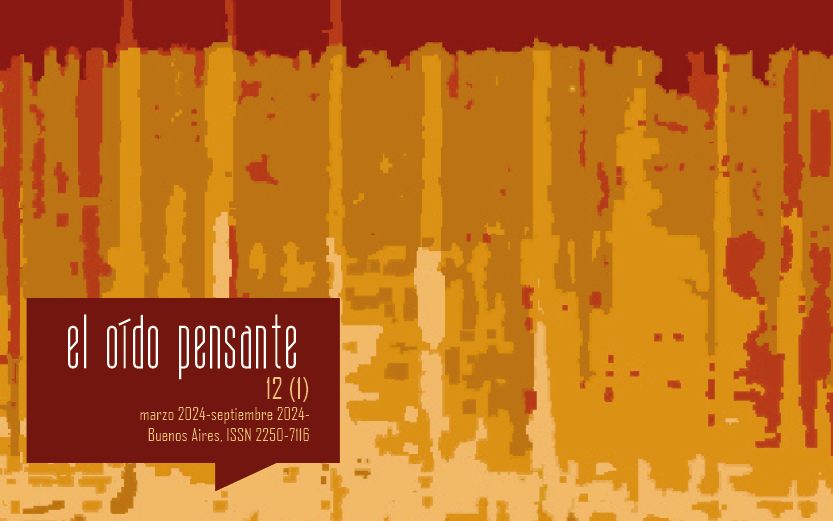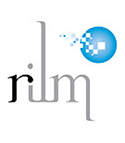Criações Artísticas Musicais e Inteligência Artificial (2019-2022)
Resumo
O objetivo desta pesquisa foi analisar como a Inteligência Artificial foi utilizada na criação artística musical entre os anos de 2019 e 2022. Para isso, foram realizadas três tarefas-chave: (i) descrever as diferentes utilizações da Inteligência Artificial no campo musical, (ii) examinar as vantagens e desvantagens de sua aplicação e (iii) comparar três casos específicos de implementação da Inteligência Artificial na música (Massive Attack, DeepBeat, These Lyrics Do Not Exist). Foi empregada uma metodologia qualitativa que envolveu uma revisão abrangente da literatura científica e a análise detalhada de fontes primárias relacionadas aos casos mencionados. Por meio desse processo, foi possível identificar que a Inteligência Artificial tem sido cada vez mais utilizada em diferentes aspectos da música, incluindo composição, ensino e recomendação musical, tendo um impacto significativo no âmbito comercial. Da mesma forma, o uso da Inteligência Artificial na música demonstrou diversas vantagens e desvantagens em áreas como conveniência, criatividade, autonomia, propriedade intelectual, investimento, desenvolvimento tecnológico, flexibilidade e escrita musical. Além disso, a comparação detalhada dos três casos estudados permitiu evidenciar o alcance e as aplicações concretas da Aprendizagem Profunda (Deep Learning) no campo musical, mostrando sua ampla adoção e uso massivo nesta área. Um aspecto relevante que emerge desta pesquisa é a sua contribuição para a discussão sobre novos cenários e para o desenvolvimento de políticas e regulamentações no campo da criação artística com a participação da Inteligência Artificial.Downloads
Referências
Abeliuk, A. y Gutiérrez, C. (2021). Historia y evolución de la Inteligencia Artificial. Revista Bits de Ciencia, 21, 14-21. Recuperado de https://revistasdex.uchile.cl/index.php/bits/article/download/2767/2700
Amstrong, S. (2019, 15 marzo). With AI and DNA, Massive Attack are Hacking a New Kind of Music. Wired. Recuperado de https://www.wired.co.uk/article/massive-attack-mezzanine-dna
Andrés, G. D., San Martín, P. S. y Lujan Rodríguez, G. (2023). Análisis multidimensional de la sostenibilidad-DID en el contexto físico-virtual. Cuadernos.info, 54, 1-22. doi: https://dx.doi.org/10.7764/cdi.54.52515
Ben-Tal, O., Harris, M. T. y Sturm, B. L. (2021). How Music AI Is Useful: Engagements with Composers, Performers and Audiences. Leonardo, 54(5), 510-516. doi: https://doi.org/10.1162/leon_a_01959
Briot, J. P. (2021). From Artificial Neural Networks to Deep Learning for Music Generation: History, Concepts, and Trends. Neural Computing & Applications, 33(1), 39-65. doi: https://doi.org/10.1007/s00521-020-05399-0
Briot, J., Hadjeres, G. y Pachet, F. (2020). Deep Learning Techniques for Music Generation. In Computational Synthesis and Creative Systems. Springer. doi: https://doi.org/10.1007/978-3-319-70163-9
Castelli, M. y Manzoni, L. (2022). Special Issue: Generative Models in Artificial Intelligence and their Applications. Applied Sciences, 12(9), 4127. doi: https://doi.org/10.3390/app12094127
Chen, F. y Meng, H. (2022). The Use of Wireless Network Combined with Artificial Intelligence Technology in the Reform of Music Online Teaching System. Wireless Communications and Mobile Computing, 2022, 1-10. doi: https://doi.org/10.1155/2022/5957708
Choi, K., Park, J., Heo, W., Jeon, S. y Park, J. (2021). Chord Conditioned Melody Generation with Transformer Based Decoders. IEEE Access, 9, 42071-42080. Recuperado de https://ieeexplore.ieee.org/stamp/stamp.jsp?arnumber=9376975
Civit, M., Civit-Masot, J., Cuadrado, F. y Cuaresma, M. J. E. (2022). A Systematic Review of Artificial Intelligence-based Music Generation: Scope, Applications, and Future Trends. Expert Systems with Applications, 209, 118-190. doi: https://doi.org/10.1016/j.eswa.2022.118190
Corvalán, J. G. (2018). Inteligencia Artificial: retos, desafíos y oportunidades. Prometea: la primera Inteligencia Artificial de Latinoamérica al servicio de la Justicia. Revista de Investigações Constitucionais, 5(1), 297. doi: https://doi.org/10.5380/rinc.v5i1.55334
De Prisco, R., Guarino, A., Lettieri, N., Malandrino, D. y Zaccagnino, R. (2021). Providing Music Service in Ambient Intelligence: Experiments with Gym Users. Expert Systems with Applications, 177, 1-19. doi: https://doi.org/10.1016/j.eswa.2021.114951
Doush, I. y Sawalha, A. (2020). Automatic Music Composition Using Genetic Algorithm and Artificial Neural Networks. Malaysian Journal of Computer Science, 33(1), 35-51. doi: https://doi.org/10.22452/mjcs.vol33no1.3
Drott, E. (2020). Copyright, Compensation, and Commons in the Music AI industry. Creative Industries Journal, 14(2), 190-207. doi: https://doi.org/10.1080/17510694.2020.1839702
Fan, X. y Zhong, X. (2022). Artificial Intelligence-based Creative Thinking Skill Analysis Model Using Human–computer Interaction in Art Design Teaching. Computers and Electrical Engineering, 100, 1-16. doi: https://doi.org/10.1016/j.compeleceng.2022.107957
Feng, X. Q. y Pan, B. H. (2021). The Evolution of Patent System: Invention Created by Artificial Intelligence. Procedia Computer Science, 183, 245-253. doi: https://doi.org/10.1016/j.procs.2021.02.055
Hertzmann, A. (2020). Computers do not Make Art, People Do. Communications of the ACM, 63(5), 45-48. doi: https://doi.org/10.1145/3347092
Hong, J. W., Fischer, K., Ha, Y. y Zeng, Y. (2022). Human, I Wrote a Song for You: An Experiment Testing the Influence of Machines’ Attributes on the AI-composed Music Evaluation. Computers in Human Behavior, 131, 1-12. doi: https://doi.org/10.1016/j.chb.2022.107239
Kaliakatsos-Papakostas, M., Floros, A. y Vrahatis, M. N. (2020). Artificial Intelligence Methods for Music Generation: A Review and Future Perspectives. Nature-Inspired Computation and Swarm Intelligence, 217-245. doi: https://doi.org/10.1016/b978-0-12-819714-1.00024-5
KDD2016. (2016, Junio 30). KDD2016 paper 819 [Video]. YouTube. https://www.youtube.com/watch?v=Vbaf9yJ6HBc&t=2s
Kumar, L., Goyal, P. y Kumar, R. (2020). Creativity in Machines: Music Composition Using Artificial Intelligence. Asian Journal of Convergence in Technology, 6(2), 36-40. doi: https://doi.org/10.33130/ajct.2020v06i02.007
Malmi, E., Takala, P., Toivonen, H., Raiko, T. y Gionis A. (2015). DopeLearning: A Computational Approach to Rap Lyrics Generation. Recuperado de https://arxiv.org/pdf/1505.04771v1.pdf
McPherson, A. y Tahıroğlu, K. (2020). Idiomatic Patterns and Aesthetic Influence in Computer Music Languages. Organised Sound, 25(1), 53-63. doi: https://doi.org/10.1017/s1355771819000463
Miao, D., Lu, X., Dong, Q. y Hong, D. (2020). Humming-Query and Reinforcement-Learning Based Modeling Approach for Personalized Music Recommendation. Procedia Computer Science, 176, 2154-2163. doi: https://doi.org/10.1016/j.procs.2020.09.252
Muhamed, A., Li, L., Shi, X., Yaddanapudi, S., Chi, W., Jackson, D., Suresh, R., Lipton, Z. C. y Smola, A. J. (2021). Symbolic Music Generation with Transformer-GANs. Proceedings of the AAAI Conference on Artificial Intelligence, 35(1), 408 417. doi: https://doi.org/10.1609/aaai.v35i1.16117
Navarro, M. C., Oliveira, H. G., Martins, P. y Cardoso, A. (2020). Integration of a Music Generator and a Song Lyrics Generator to Create Spanish Popular Songs. Journal of Ambient Intelligence and Humanized Computing, 11(11), 4421-4437. doi: https://doi.org/10.1007/s12652-020-01822-5
Plut, C. y Pasquier, P. (2020). Generative Music in Video Games: State of the Art, Challenges, and Prospects. Entertainment Computing, 33, 1-19. doi: https://doi.org/10.1016/j.entcom.2019.100337
Rodgers, W., Yeung, F., Odindo, C.y Degbey, W. Y. (2021). Artificial Intelligence-Driven Music Biometrics Influencing Customers’ Retail Buying Behavior. Journal of Business Research, 126, 401-414. doi: https://doi.org/10.1016/j.jbusres.2020.12.039
Rakhmatullaev, H. S. (2022). Music, Man and Artificial Intelligence. Central Asian Journal of Social Sciences and History, 3(12), 93-96. Recuperado de https://cajssh.centralasianstudies.org/index.php/CAJSSH/article/view/540
Rouhiainen, L. P. (2018). Inteligencia Artificial. 101 Cosas que debes saber hoy sobre nuestro futuro. Alienta Editorial. Recuperado de https://static0planetadelibroscom.cdnstatics.com/libros_contenido_extra/40/39308_Inteligencia_artificial.pdf
Salem, A., El-Horbaty, E. y Siphocly, N. (2019). Analysis of Computational Intelligent Techniques of Music Generation. Egyptian Computer Science Journal, 43, 49-64. Recuperado de http://ecsjournal.org/Archive/Volume43/Issue3/4.pdf
Schmidt, P., Biessmann, F. y Teubner, T. (2020). Transparency and Trust in Artificial Intelligence Systems. Journal of Decision Systems, 29(4), 260-278. doi: https://doi.org/10.1080/12460125.2020.1819094
Steels, L. y Lopez De Mantaras, R. (2018). The Barcelona Declaration for the Proper Development and Usage of Artificial Intelligence in Europe. AI Communications, 31(6), 485-494. doi: https://doi.org/10.3233/aic-180607
Sturm, B. L. T., Iglesias, M., Ben-Tal, O., Miron, M. y Gómez, E. (2019). Artificial Intelligence and Music: Open Questions of Copyright Law and Engineering Praxis. Arts, 8(3), 115. doi: https://doi.org/10.3390/arts8030115
Tahiroğlu, K. (2021). Ever-Shifting Roles in Building, Composing, and Performing with Digital Musical Instruments. Journal of New Music Research, 50(2), 155-164. doi: https://doi.org/10.1080/09298215.2021.1900275
The Economist. (2018, 28 Marzo). Non-Tech Businesses are Beginning to Use Artificial Intelligence at Scale. Recuperado de https://www.economist.com/special-report/2018/03/28/non-tech-businesses-are-beginning-to-use-artificial-intelligence-at-scale
These Lyrics do not Exist. (2022). Lyrics Generated Using Artificial Intelligence. Recuperado de https://theselyricsdonotexist.com/
Wei, J., Marimuthu, K. y Prathik, A. (2022). College Music Education and Teaching Based on AI Techniques. Computers and Electrical Engineering, 100, 6-9. doi: https://doi.org/10.1016/j.compeleceng.2022.107851
Yang, J. (2021). Research on the Artificial Intelligence Teaching System Model for Online Teaching of Classical Music under the Support of Wireless Networks. Wireless Communications and Mobile Computing, 2021, 1-11. doi: https://doi.org/10.1155/2021/4298439
Zhang, W., Shankar, A., and Antonidoss, A. (2021). Modern Art Education and Teaching Based on Artificial Intelligence. Journal of Interconnection Networks, 22(Supp01). doi: https://doi.org/10.1142/s021926592141005x























